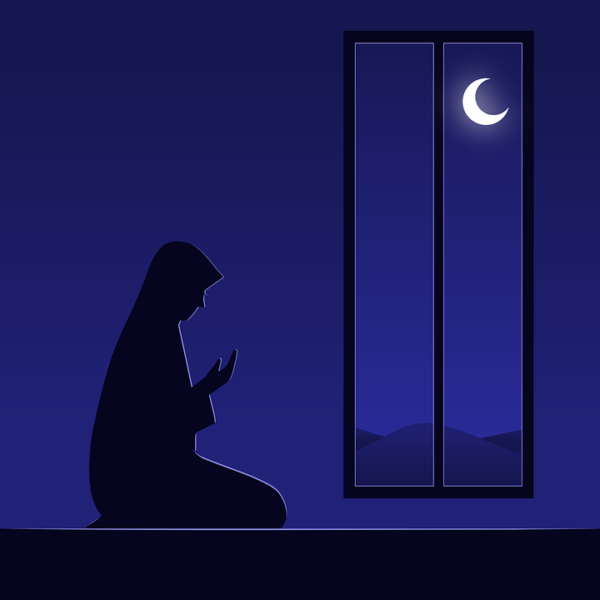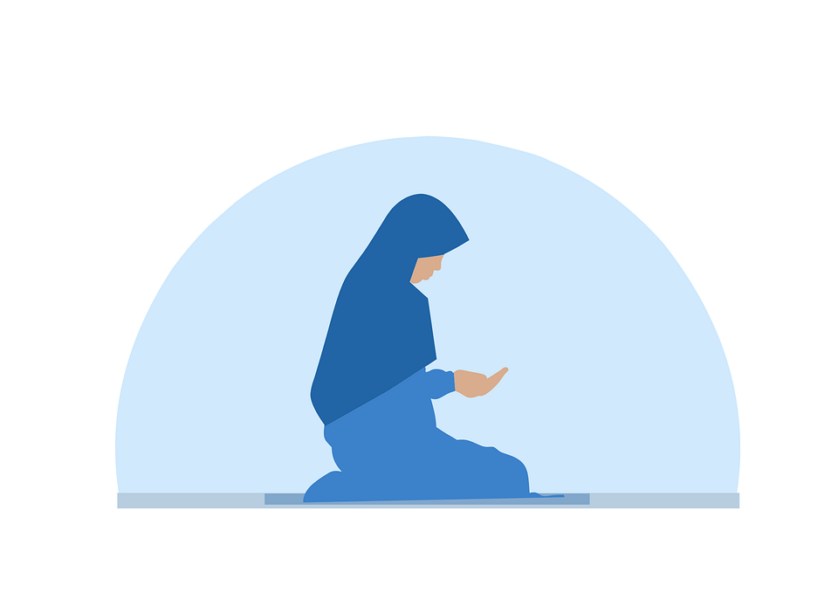
Qiyam al-Layl: a time to unleash the shackles that weigh us to this dunya and, instead, to attach our hearts to the Lord of the Worlds.
With Ramadhan just hours away, our mosques will soon be flooded with congregations around the world; the old and young, the men and women, the black and white, those excitedly looking forward in hope and the broken hearted, desperate for healing – all standing before their Lord in union, throughout the night. Often known as the best of prayers after the obligatory ones, it’s crucial that we know more about Qiyam al-Layl is, and what the secrets we can discover from observing it.
What is Qiyam al-Layl and When Does it Take Place?
Qiyam al-Layl’s literally means to ‘stand during the night,’ however, in an Islamic context it refers to the period you dedicate praying to and remembering Allah between the completion of the ‘Isha salah and the break of dawn (Fajr), even if that’s but an hour.
Contrary to the popular assumption that Qiyam al-Layl is exclusively units of voluntary prayers, it is actually far broader than that. Qiyam al-Layl is in fact an umbrella term for the performance of general worship, between the start of ‘Isha and the entrance of the dawn.
As well as non-obligatory prayers, this precious time also encompasses dhikr (remembrance), tasbih (glorification), the recitation of the Qur’an, listening to hadith, sending blessings upon the Prophet (saw), and standing in night prayer (tarawih and tahajud). The best time for it is the last third of the night.
Isn’t it just the same as tahajud?
Tahajud refers to specifically praying at night, whereas Qiyam al-Layl is more general and encompassing.
“And in some parts of the night (also) offer the prayer with it (i.e. recite the Quran in the prayer) as an additional prayer for you (O Muhammad). It may be that your Lord will raise you to a station of praise and glory, i.e., the honour of intercession on the Day of Resurrection.” (Qur’an, 17:79)
The word itself originates from hujood, which means doing one action and its opposite. As it means waking after sleeping it became known as the name for prayer, when an individual gets up at night after sleeping, though most scholars say it can refer to praying at any time during the night.

So what’s tarawih?
Tarawih is the term used to refer to Qiyam al-Layl in the month of Ramadhan, a highly recommended sunnah of the Prophet (saw). It is performed at the beginning of the night, and should be made light and not lengthy.
What are its virtues?
As a highly revered act of worship in Islam, its virtues are many.
A Path to Paradise
One of the means of attaining Paradise, the ultimate goal of every believer, is through the observance of Qiyam al-Layl. Sacrificing the comfort of your bed, in the depths of the night, to have a sincere conversation with your Lord is an effort that is recognised and the reward from Allah is beyond our comprehension.
“Their sides forsake their beds (get up at night), to invoke their Lord in fear and hope…No person knows what is kept hidden for them of joy as a reward for what they used to do” (Qur’an, 32:16-17)
Its reward is immense due to the fact it is harder on our nafs, as night is naturally a time of rest from the toils of the day, so leaving sleep, despite our natural yearning for it, is a great struggle and sacrifice.
The Best of the Voluntary Prayers
“The best prayer after the obligatory prayer is prayer at night.” (Muslim)
Out of the various non-compulsory prayers mentioned in the Sunnah, Qiyam al-Layl holds a superior status above all of them. So it’s only natural then, given its exalted status, that we should be keen to incorporate it in our nightly routines.
As Imam Saffarini explained, its superiority is due to the fact it is “more concealed and closer to sincerity.” The righteous earliest generations of Muslims strove hard to hide their secret deeds, to the extent that when they had visitors staying overnight, they would pray without their guests knowing.
It is also more virtuous because our hearts are more attentive at night, where the matters that preoccupy us during the hustle and bustle of the day are now silent. We’re therefore more likely to reflect more deeply on what we recite too. For that reason, we’ve been commanded to the recite the Qur’an during our night prayers in a slow and steady recitation (tartil).

It contains an hour where prayers are answered
Our Creator provides for us at every moment of every day. Despite that, He still provides exclusive periods where worship and seeking His help is specifically encouraged and granted.
Qiyam al-Layl contains a time when the doors of the sky are opened, supplications answered, and the needs of those who ask fulfilled.“Verily, in the night there is an hour, no Muslim reaches it, asking Allah for goodness from matters of the dunya or the Akhirah, except that Allah gives it to him, and that is in every night.” (Muslim)
Such is the beauty and immense bounty of our Lord, that He descends to us in this time, turning to those who seek Him:
“The Lord descends every night to the lowest heaven when one-third of the night remains and says: ‘Who will call upon Me, that I may answer Him? Who will ask of Me, that I may give him? Who will seek My forgiveness, that I may forgive him?” (Bukhari
It is the quality of the devout
Allah mentions Qiyam al-Layl as the practice of His most devoted servants:
“[The (faithful) servants of the Merciful are they who walk upon the earth modestly, and when the foolish one address them answer: Peace; And who spend the night before their Lord, prostrate and standing.” (Qur’an, 25:63-64) He (swt) highlighted the clear difference between those who strive to perform this great deed and those who leave it:
“Is the one who worships devoutly in the watches of the night, prostrate and standing, fearful of the Hereafter and hoping for the mercy of his Lord, (to be accounted equal with a disbeliever)? Say: are those who know equal with those who know? But only people of understanding will pay heed.” (Qur’an, 39:9)
An Expiation of and Protection from Sin
“You should pray qiyam al-Layl, for it is the custom of the righteous who came before you and it brings you closer to your Lord, and expiates sins and prevents misdeeds.” (at-Tirmidhi) With everyday life presenting so many tests and turns, avoiding sins can be difficult. We should therefore be in an ever-constant process of shielding ourselves from the potential for bad deeds, as well as purifying ourselves from the sins we’ve already amassed. Qiyam al-Layl, as the Prophet (saw) explained, offers us precisely that – a chance to not only be drawn closer to Allah, but also the opportunity to expiate and protect ourselves from sins.
Being Protected from Heedlessness
“Whoever prays qiyam reciting ten verses will not be recorded as one of the heedless. Whoever prays qiyam reciting one hundred verses will be recorded as one of the devout. Whoever prays qiyam reciting one thousand verses will be recorded as one of those who collected a great deal of reward.” (Abu Dawud) It’s a simple formula – the more you recite, the greater the reward you amass and the status you attain. And even the shortest recitation carries such an immense reward.
To put that into context, simply by reciting Surah al-Fatiha twice, as you would during just a 2 unit prayer, is already 14 verses!
It is witnessed by the angels!
By standing in Qiyam, we combine the virtues of prayer and recitation of His Words.
“You should recite the Qur’an and remember Allah, for that will be light for you on earth and will be stored up for you in heaven.” (at-Targhib wat-Tarhib)
The Sahaba explained how they would be instructed to use the siwak before they prayed, to clean any bad odour from their mouths, due to the presence of the angels.
“When a person stands to pray, the angel comes to him and stands behind him, listening to the Qur’an and drawing closer, and he continues to listen and draw closer until he puts his mouth to his mouth, so he does not recite any verse but it goes inside the angel.” (al-Bayhaqi)

Being Amongst the Truthful and Martyrs
The level of the shahid (martyr) is one of the highest and most sought-after stations in Islam. A man came to the Prophet (saw) and said to him: “O Messenger of Allah, what do you think if I bear witness that there is no god except Allah and that you are His Messenger, and I pray the five daily prayers, and fast the month (of Ramadan), and pray qiyam in Ramadhan, and pay zakah?” The Prophet (saw) assured him, “Whoever dies doing that will be one of the siddiqs and martyrs.” (Ibn Khuzaymah)
It’s a time for families to come together
The most blessed of unions are those when two hearts come together to encourage each other, striving for His Sake.
The Prophet (saw) said: “Whoever wakes up at night and lets his wife do so in order to offer two rak’ahs, will be recorded amongst those who remember Allah much in that night.” (Abu Dawud)
The rewards for this beautiful time are limitless. We hope that this has geared you up for the precious nights to come! May Allah adorn your nights of Ramadhan with qiyam and accept it from you! Ameen